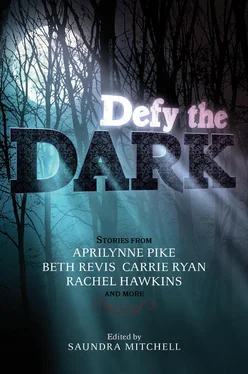When the spider children began to scream with him, an almost beautiful sound, like wolves howling, Cado’s arm stopped swinging. Because the motorman was dead, just an untidy leggy heap.
Cado clambered over the motorman and settled into the driver’s seat. He put the trolley into reverse and hid from the light as best he could.
The trolley pulled up in front of the St. Teresa stop and Cado exited, his eyes so traumatized by light that several seconds passed before they adjusted enough to see Patricia sitting on the blue bench. Her sunset gown covered with a black silk robe. Her feet bare.
Her toe polish chipped.
“You came back,” she said wonderingly, staring at him like she’d never seen him before.
Cado grabbed her and lifted her off her feet. “Why are you running the streets barefoot like a country girl?”
“Never mind my feet!” She squeezed him even harder than he was squeezing her. “You sounded so weird on the phone. I just knew—”
Whatever she knew was drowned out by the cathedral bells striking four.
He’d only been gone an hour? It had felt like a million years. Yet there was the dead woman, as faceless as ever but no longer animated. The lampposts were on again. Maybe they’d never gone out—he had gone out.
Cado buried his face in her neck. “You smell good.”
“Like Paris, still?” said Patricia, amused that he thought such things when he’d never been out of Texas. “Or maybe like Amsterdam?”
“Like life.”
“You know now, don’t you?” she said. “What I meant about reality?”
He nodded, then tried to speak, but it took a while. Patricia understood. She lived in a town where everyone understood such things. But only he had survived it.
He sat with her on the bench and told her what had happened.
“How strange,” Patricia said when he was done, staring at the trolley and the spidery surprise inside. “But it’ll make a nice addition to the museum exhibit, I’m sure. Can I see the knife you killed it with?”
“You can have it,” said Cado, handing her the case. “That can be our symbol, since you hate flowers.”
“Your flute can be our symbol?” said Patricia, confused.
“My flute’s in the trunk of my car still,” Cado explained, snapping the latches open. “I lost the sheath to my hunting knife, so I’ve been carrying it around in this old case ever since.”
Patricia turned the knife, cloudy with alien blood, this way and that. “What’s the symbol?”
“That our love can destroy anything.” As soon as Cado said it, he regretted it, struck by a powerful image of Patricia and him rampaging like Godzilla, trampling whole cities into rubble.
“Cado”—Patricia clutched the knife to her chest—“that’s so sweet!”
He took her in his arms, carefully, and then kissed her. “And just for the record,” he said, “that wasn’t a good-bye kiss, either.”
Some time later, after Cado had insisted on dressing her feet in his Chucks, they began the walk back to Patricia’s house.
“Are you brave enough to make a decision now?” she asked him.
“Rice,” he said immediately. “If they’ll have me.”
Her squeal of joy echoed over the whole town.
“I feel stupid to have been so worried,” he said, the bricks of the sidewalk cool beneath his socks. “Life’s too short not to do what you want.”
“Sorry I didn’t believe in you,” Patricia said as they stepped over the dead woman in unison. “I do now. You look like one of us—brave and confident. A touch insane.”
His stomach growled.
“And hungry.”
“I can’t be hungry,” said Cado, almost offended by his stomach’s insistent rumbling. “I was nearly killed, like, ten minutes ago.”
“Life doesn’t stop just because a spider creature nearly lays eggs in you, Cado. Of course you’re hungry. There’s lobster salad left over from lunch.” She smiled. “Or we could have tea sandwiches and caviar.”
Cado sighed. “Do I have to wear a tie?”
“I’ll make an exception,” Patricia said generously, “just this once.” Arm in arm, they disappeared blithely into the dark.
1. October 31, 11:57 p.m.
McKenzie shows up at the Spruce Street Guest House a few minutes before midnight, dressed all in black as if she’s some kind of ninja. She’s even got a black stocking cap pulled over her blond hair, which is sticking out from the bottom in a luminous sheet and ruining the disguise. She’s carrying a backpack, out of which she pulls a flashlight. “Ty?” she whispers.
She can’t see me. I’m leaning against the back of the house, and the light of the half-moon doesn’t reach that far into the covered porch. I step forward and she squeals in fright.
“Jesus! You scared the hell out of me.”
“Sorry,” I say. “You sure you want to do this?”
She huffs a little, as if I’ve offended her. “Whatever, you just startled me. I’m prepared for what’s in there .” She clicks on the flashlight and sets it on the top step while she opens her backpack to rummage through it. “I brought an audio recorder and a video recorder, although it probably won’t pick up much in the dark.” She pulls out a slim metallic device and hits the power button. A tiny red light glows at the tip. “Audio’s on. I’m putting it in the outer pocket of my backpack so it’ll be recording the whole time.” She stuffs her video camera into her pocket and slings her backpack on again. “You ready?” she says, picking up the flashlight.
“I guess. I didn’t bring any equipment.”
McKenzie grins. “That’s what I’m here for. This is your first ghost hunt; how would you know?”
“Uh . . . TV?”
McKenzie laughs and climbs the porch steps. “Don’t believe everything you see on TV.” The back door is locked, but McKenzie pulls a key out of her pocket.
“Where’d you get that?” I ask.
“Kelsey’s mom’s on the Pinnacle Ghost Tour staff. Kelsey swiped it and made a copy.” She unlocks the door and pushes it open. The hinges whine, a thin, shrill noise as unpleasant as fingernails down a chalkboard. “You ready to see what Pinnacle’s all about?” McKenzie asks.
There’s a hint of a come-on in her voice and, despite everything, it gets to me. I wish I could see her face, but it’s too dark. “You bet,” I say, and I follow her inside.
Pinnacle, Colorado, bills itself as the Salem of the Rockies—except there have never been any witches here, and it’s not exactly in the mountains. But people love that slogan, even if it’s a marvel of false advertising. Pinnacle is a dinky little town on the flat part of Colorado (people always seem to forget about the flat part), an hour and a half from the Rockies and a light-year from San Francisco, where I grew up. I moved here with my parents and little sister in August when my dad got a job at a technology company. They like to think of Colorado as a social experiment—a chance to see the middle of America—but I think of it as time in purgatory. I have one year left of high school, and then I’m heading back to Cali.
The only good part about being here, at least until tonight, has been McKenzie.
She enters the kitchen and shines the flashlight around. It’s dirty and dilapidated and creepy: everything a haunted house is supposed to be. A bunch of the bottom cabinets have rotted, making the counters slope toward the floor. The upper cabinets have mostly lost their doors, turning them into yawning black boxes displaying a few pieces of chipped china. The ancient stove looks like it hasn’t been operational in decades, and the once-white sink has reddish stains in the bottom. “Gross,” McKenzie murmurs as she looks down into the sink.
Читать дальше












